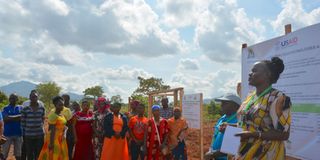Climate experts visit Tanzania

Mvomero District Agriculture Irrigation and Cooperative Officer in Morogoro Region (DAICO), Daina Muywanga, welcomes participants of the pilot training course on landscape climate smart agriculture recently. PHOTO | IITA TANZANIA
What you need to know:
Team is training planners and key stakeholders at the regional and district levels
Dar es Salaam. A team of international experts is in the country to initiate climate smart agriculture (CSA) projects involving small holder farmers.
They are training planners and key stakeholders at the regional and district levels on how to support small holder farmers to cope with climate change.
One of the training has just ended in Morogoro and was undertaken as part of USAIDsupported Building Capacity for Resilient Food Security project.
“This training is critically important in supporting the government’s efforts to sustainably increase agricultural productivity,” said Shakwaanande Natai, an agricultural expert.
According to the official, who is the head of environmental unit in the ministry of Agriculture, the project is geared towards enabling farmers mainstream CSA.
This will be realised through caring for the environment and controlling and reducing reduce greenhouse gas emissions, which are blamed for global warming.
The experts are drawn from the University of California, Davis, the USAID California Business Hub, EcoAgriculture Partners, Cornell University and the International Institute of Tropical Agriculture (IITA).
USAID provided funds for the March 25 to 29 training which took place in Morogoro. Another five day training will take place in Zanzibar from today (April 1).
The training specifically brings together action-oriented leaders that can influence others and create an enabling environment for transformation of agricultural systems.
Dr Hassan Shelukindo, the principal agricultural officer in the Regional Administration and Local Government ministry, said climate change is real, urging Tanzania to put in place mitigation measures.
‘Though we are not emitting much as a country, we are very much affected,” he said, calling for concrete action to arrest climate change. IITA says climate change is among top threats to global food security due to impacts of extreme weather conditions such as floods and severe droughts.
Experts say crop yields are expected to decline globally after 2030 and that by 2050, three per cent of Africa’s land will no longer be suitable for maize farming.
“In Tanzania, climate change is a major hindrance to efforts to increase agriculture productivity for food security”, IITA said in a statement to The Citizen.
The government launched its National CSA Guidelines in May 2017 in collaboration with development partners and the private sector.
Climate-smart agriculture (CSA) is an approach that helps to guide actions needed to transform and reorient agricultural systems to effectively support development and ensure food security in a changing climate. CSA aims to tackle three main objectives: sustainably increasing agricultural productivity and incomes; adapting and building resilience to climate change; and reducing or removing greenhouse gas emissions where possible.


